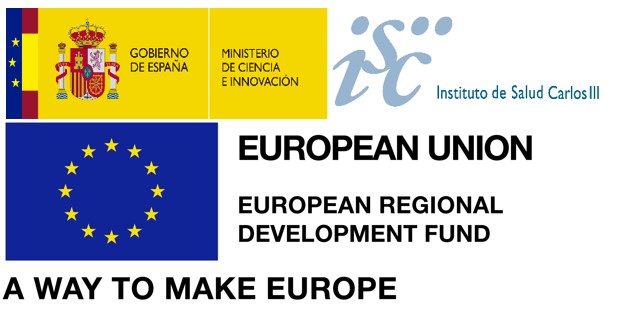About
The IVECAT group has the ultimate goal to transfer knowledge to society, harnessing Extracellular Vesicles (EVs) as "theranostic" actors.
The group has a strong background in immunology & inflammatory disorders, and works on EVs since 2006, with a special interest in their application in diagnostic (biomarkers) and therapeutic (advanced therapies) approaches.
- Development of new strategies for the improvement in the objective diagnosis of diseases/pathologies.
- Research in the field of Cell & "Cell-free" advanced therapies for immunomodulation and regenerative medicine.
As a basic research group, the group has established multiple and transversal collaborations with clinical services at Germans Trias i Pujol University Hospital. In particular, with the Nephrology Service, but also with Cardiology, Neurology, Ophthalmology, Endrocrylogy and Infectious Diseases, among others.
Keywords: Translational medicine, extracellular vesicles, exosomes, advanced therapies, biomarkers.
_1687343477.jpg)
Group leader
- Francesc E. Borràs Serres
Francesc E. Borràs Serres
Borràs’ scientific career started at the Department of Physiology-Faculty of Biology at University of Barcelona (UB), studying the biology of macrophages under the supervision of Dr Antonio Celada. After obtaining his PhD degree (Cum Laude) in 1998, he moved to a 3-year post-doctoral position in the UK (1998-2001), joining the Histocompatibility & Immunogenetics Lab of the National Blood Service led by Dr Cristina Navarrete. There, he developed studies on the biology of Dendritic Cells for three years. Among other studies, their group first defined the presence of plasmacytoid
dendritic cells in cord blood.In 2002, Francesc E. Borràs was granted a position from the "Miguel Servet" program for the re-incorporation of researchers, and joined the Immunology Lab at Germans Trias i Pujol University Hospital (HUGTiP), led by Prof Ricardo Pujol-Borrell, to develop a new line of research on DCs, while starting to also work in the nascent field of Extracellular Vesicles. Later, in 2008, Borràs gained a consolidated position as a "Miguel Servet Level A" researcher promoted by Instituto de Salud Carlos III (ISCIII) and the Ministry of Health of Generalitat de Catalunya (CES 07/015), recognising the development of a new line of research within established research laboratories. A few months later, he founded his own Research Group on Innovation in Vesicles and Cells for Application in Therapy (IVECAT Group).
In 2012, Borràs passed a first five-year evaluation from Institut Català de la Salut (ICS) as a senior researcher at IGTP. He was later appointed as research coordinator of the Nephrology Service at HUGTiP to coordinate the research activity of this clinical service. By bringing together clinicians and translational researchers, the REMAR Group (Research in Kidney Diseases) was established. This group has been awarded as consolidated group by the Agency for Management of University and Research Grants (AGAUR).
In 2023, Borràs passed his third and final five-year evaluation commission at ICS as principal investigator, being awarded the highest "A" level. To date, he has participated in the publication of more than 90 manuscripts, four book chapters, four patents and have obtained continuous public and private funding. Borràs has also directed 13 doctoral thesis, five of them receiving awards.
Borràs actively participates and has participated in several scientific forums: i) member of the Board of the Catalan Society of Immunology (2008-12), ii) Editor of Immunology (Journal of the Spanish Society of Immunology, 2010-13). In 2014, together with colleagues, he founded the Spanish Group for Innovation and Research in Extracellular Vesicles (GEIVEX), being vice-president until 2023. Since 2007, he has been assistant professor of Immunology at UB.
In 2014, Borràs was co-founder of Innovex Therapeutics SL. Currently, he is CSO of DeBios Diagnostics SL, a spin-off of IGTP aiming to develop IVD products based on EVs.
Contact: feborras(ELIMINAR)@igtp.cat
ORCID: 0000-0003-4038-1912 - Marcel·la Franquesa Bartolomé

Marcel·la Franquesa Bartolomé
Marcel·la Franquesa is a biologist with a translational interest in the field of Nephrology. The focus of her research has always been the advanced therapies and regenerative therapies in kidney disease. From gene therapy and cell therapy to the current main interest in EVs as therapeutic targets. During her career, she had the opportunity to work in different laboratories such as the Experimental Nephrology lab led by Dr J Grinyó at IDIBELL, the Nephrology Lab led by Dr J Bonventre at Harvard Medical School and the Transplantation Lab led by Carla Baan at Erasmus MC.
Franquesa has been board member of ECTORS (Cell therapy and Regeneration Section of the European Society of Organ Transplantation-ESOT), and is currently vice-chair of the Spanish Group for Innovation and Research in Extracellular Vesicles (GEIVEX).
Contact: mfranquesa(ELIMINAR)@igtp.cat
ORCID: 0000-0002-1287-8908
Team
PhD students
Marta Clos-Sansalvador, BSc(ELIMINAR)
Marta Sanroque Muñoz, BSc(ELIMINAR)
Omar Taco, MD(ELIMINAR)
Sergio Garcia Garcia, BSc(ELIMINAR)
Linrong Pan, MD(ELIMINAR)
Lab technician
Miriam Font Moron(ELIMINAR)
Business development
Albert Mascarell, BSc PhD(ELIMINAR)
Research lines
Development of new strategies for the improvement in the objective diagnosis of diseases/pathologies
PI: Dr Francesc E. Borràs
This line of research has a clear translational vocation aiming to improve the quality of life of patients, defining new approaches to avoid or reduce the need on invasive techniques such as biopsies. In this regard, the group is undergoing several studies to define these new strategies in diverse pathological processes, including renal fibrosis, polycystic kidney disease, dialysis complications, among other pathologies.
Research in the field of preventive and therapeutic Cell & "Cell-free" advanced therapies for immunomodulation and regenerative medicine
PI: Marcel·la Franquesa
This line of research derives from the interest of the group in the development of basic research projects with a medium-long term translational vision. In this regard, the group has developed in recent years different funded proposals in order to explore more deeply the therapeutic potential of cell therapy (such as mesenchymal stem cells or regulatory B cells) and new approaches of "cell-free" therapies, including harnessing of extracellular vesicles.
Active projects
Glaucoma y Vesículas Extracelulares (GLAUVEX): Biomarcadores e intervención terapéutica
PI: Francesc E. Borràs
Funding agency: Instituto de Salud Carlos III (ISCIII)
Agency code: PI22/00688
Duration: 02/01/2023 - 01/01/2026
Urine extracellular vesicles and graft elastography: Combining molecular and imaging techniques for the non-invasive diagnosis of chronic kidney graft dysfunction (EV-mage)
PI: Francesc E. Borràs, Javier Juega
Funding Agency: Instituto de Salud Carlos III (ISCIII)
Agency code: PI19/00837
Duration: 2020 - 2024

Size-exclusion chomatography (SEC) isolated MSC-derived Extracellular Vesicles to pReVEnT the progression of chronic kidney disease - SERVET
PI: Marcel·la Franquesa
Funding Agency: Instituto de Salud Carlos III (ISCIII)
Agency code: PI20/00097
Duration: 01/01/2021 – 30/06/2025
FIBROKIT - Primera tecnología no invasiva per detectar i monitoritzar la fibrosi renal
PI: Francesc E. Borràs
Funding Agency: Agència de Gestió d'Ajuts Universitaris i de Recerca (AGAUR)
Agency code: 2023PROD0009
Duration: 01/02/2024 - 31/07/2025
FIBROKIT: First IVD-based non-invasive monitoring of kidney fibrosis
PI: Francesc E. Borràs
Funding Agency: Fundació "la Caixa"
Agency code: CI23-30015
Duration: 01/01/2024 - 31/12/2025
Spain CKD cause (SPACKDc)
PI: Alberto Ortiz Arduan
Funding Agency: Ministerio Ciencia e Innovación
Agency code: PMP21/00109
Duration: 01/01/2022 - 12/2025
Células dendríticas tolerogénicas autólogas donante-específicas (dsATDC) para receptores de trasplante de riñon altamente sensibilizados
Collaboration
Funding Agency: Instituto de Salud Carlos III (ISCIII)
Agency code: ICI21/00049
Duration: 01/01/2022 - 31/12/2025
Size-exclusion chomatography (SEC) isolated MSC-derived Extracellular Vesicles to pReVEnT the progression of chronic kidney disease- SERVET
PI: Marcel·la Franquesa
Funding agency: Instituto de Salud Carlos III (ISCIII)
Agency code: PI20/00097
Duration: 01/01/2021 - 31/06/2025
Contrato Miguel Servet
PI: Marcel·la Franquesa
Funding Agency: Instituto de Salud Carlos III (ISCIII)
Agency code: HHRR CP19/00018
Duration: 2020 - 2024
Contrato predoctoral de formación en investigación en salud (PFIS)
PI: Marta Clos Sansalvador
Funding Agency: Instituto de Salud Carlos III (ISCIII)
Agency code: HHRR FI20/00021
Duration: 2020 – 2023
Personal investigador en formació (PIF)
PI of the group
Funding Agency: Departament de Salut- Generalitat e Catalunya
Agency code: HHRR FI20/00021
Duration: 2023 - 2025
RICORS2040 network
PI of the group, collaboration
Funding Agency: Instituto de Salud Carlos III (ISCIII)
Agency code: RD21/0005/0009
Duration: 2023 - 2025
Past projects
Fibrokit - Urine Extracellular Vesicles based diagnosis for Non-invasive monitoring of renal dysfunction and fibrosis grade
PI: Francesc E. Borràs
Funding agency: Obra Social Fundación "la Caixa"
Agency code: CI19/000448
Duration: 01/01/2020 – 31/12/2021
Primera tecnologia no invasiva para detectar y monitorizar la fibrosis renal
PI: Francesc E. Borràs
Funding agency: FIPSE
Duration: 01/11/2022 - 01/06/2023
IVD-based non-invasive detection & monitoring of kidney fibrosis
PI: Francesc E. Borràs
Funding Agency: CERCA Gínjol Patent Funds
Duration: 01/09/2022 - 01/09/2023
Inducción y caracterización de células B reguladoras con finalidades terapéuticas. Nuevas estrategias terapéuticas en Trasplante - reBeCT
PI: Marcel·la Franquesa
Funding Agency: Instituto de Salud Carlos III (ISCIII)
Agency code: Pi17/02335
Duration: 01/01/2018 - 30/06/2021
FIBROKIT - First non-invasive solution for detection & monitoring renal fibrosis
PI: Francesc Enric Borràs
Funding agency: Agència de Gestió i d'Ajuts Universitaris i de Recerca (AGAUR) - Ajut INNOVADORS
Agency code: 2022 INNOV 00027
FIPSE - Ayudas para la Financiación de estudios de viabilidad de la Innovación en Salud
PI of the group
Funding Agency: MSC
Duration: 2022 - 2023
Kit de diagnóstico no invasivo para monitorizar la fibrosis en pacientes con trasplante de riñón
PI: Francesc E. Borràs
Funding Agency: Fundación "la Caixa", CaixaResearch Validate
Agency code: PMP21/00109
Duration: 2020 - 2022
Project CPS 2021-041
PI of the group
Funding Agency: Gain Therapeutics
Date: 2021
Urine extracellular vesicles and graft elastography: Combining molecular and imaging techniques for the non-invasive diagnosis of chronic kidney graft dysfunction (EV-mage)
PI: Francesc E. Borràs
Funding Agency: Instituto de Salud Carlos III (ISCIII)
Agency code: PI19/00837
Duration: 01/01/2020 – 31/12/2022
FIBROKIT - Test no invasivo para monitorizar la fibrosis renal
PI: Francesc E. Borràs
Funding Agency: Departament de Salut - Generalitat e Catalunya
Agency code: SLT033/23/000014
Duration: 01/01/2024 - 31/12/2024
Scientific publications
Highlighted publications
Clos-Sansalvador M, Monguió-Tortajada M, Grau-Leal F, Ruiz de Porras V, Garcia SG, Sanroque-Muñoz M, Font-Morón M, Franquesa M, Borràs FE. Agarose spot migration assay to measure the chemoattractant potential of extracellular vesicles: applications in regenerative medicine and cancer metastasis. BMC Biol. 2023 Oct 26;21(1):236. DOI: 10.1186/s12915-023-01729-5.
Clos-Sansalvador M, Garcia SG, Morón-Font M, Williams C, Reichardt NC, Falcón-Pérez JM, Bayes-Genis A, Roura S, Franquesa M, Monguió-Tortajada M, Borràs FE. N-Glycans in Immortalized Mesenchymal Stromal Cell-Derived Extracellular Vesicles Are Critical for EV-Cell Interaction and Functional Activation of Endothelial Cells. Int J Mol Sci. 2022 Aug 23;23(17):9539. DOI: 10.3390/ijms23179539.
Carreras-Planella L, Cucchiari D, Cañas L, Juega J, Franquesa M, Bonet J, Revuelta I, Diekmann F, Taco O, Lauzurica R, Borràs FE. Urinary vitronectin identifies patients with high levels of fibrosis in kidney grafts. J Nephrol. 2021 Jun;34(3):861-874. DOI: 10.1007/s40620-020-00886-y.
Monguió-Tortajada M, Gálvez-Montón C, Bayes-Genis A, Roura S, Borràs FE. Extracellular vesicle isolation methods: rising impact of size-exclusion chromatography. Cell Mol Life Sci. 2019 Jun;76(12):2369-2382. DOI: 10.1007/s00018-019-03071-y.
Monguió-Tortajada M, Prat-Vidal C, Moron-Font M, Clos-Sansalvador M, Calle A, Gastelurrutia P, Cserkoova A, Morancho A, Ramírez MÁ, Rosell A, Bayes-Genis A, Gálvez-Montón C, Borràs FE, Roura S. Local administration of porcine immunomodulatory, chemotactic and angiogenic extracellular vesicles using engineered cardiac scaffolds for myocardial infarction. Bioact Mater. 2021 Mar 15;6(10):3314-3327. DOI: 10.1016/j.bioactmat.2021.02.026.
Additional information
Patents
Title: New protein markers of renal damage
Publication code: WO2021 130138 A1
Inventors: Francisco E. Borras Serres, Ricardo Lauzurica Valdemoros, Laura Carreras Planella
Country: Spain
Publication date: 01/07/2021
Assignee: Institut d'Investigació en Ciències de la Salut Germans Trias i Pujol
Title: Method and kit for the diagnosis and/or prognosis of inflammatory conditions
Publication code: EP18382808.6
Inventors: Rosa Sarrias Fornes, Gemma Aran Canals, Erica Tellez Caballero, Cristina Vilaplana Massaguer, Francisco E. Borràs Serres
Country: Spain
Publication date: 15/11/2018
Assignee: Institut d'Investigació en Ciències de la Salut Germans Trias i Pujol
Title: In vitro method for the diagnoses of synucleinopathies
Publication code: 18382540.5-1118
Inventors: Katrin Beyer, Francesc Borras Serres, Ana Gamez Valero, Ramiro Alvarez
Country: Spain
Publication date: 19/07/2018
Assignee: Institut d'Investigació en Ciències de la Salut Germans Trias i Pujol
News
Celebrando el Día Internacional de la Mujer: la voz de nuestras profesionales
Para conmemorar el Día Internacional de la Mujer, hemos realizado cuatro preguntas a investigadoras de diversos perfiles del IGTP y profesionales de distintas áreas de apoyo a la investigación. El objetivo es conocer las dificultades que han enfrentado como mujeres en el campo profesional y entender sus perspectivas sobre el futuro.
Las noticias más destacadas del año 2023 en el IGTP
En 2023, el IGTP ha seguido haciendo avances significativos acorde con su misión. En este artículo, repasamos las noticias más destacadas del año, que reflejan la persistencia y el espíritu colaborativo que sustentan esta institución.
Contact
(+34) 93 033 05 26
Marcel·la Franquesa (Advanced Therapies)
More links
IVECAT blog · Follow @ivecat_igtp on X · Follow @GEIVEX on X


